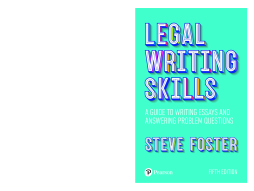
Additional Information
Book Details
Abstract
Strong writing skills are an essential ingredient to succeeding in your law degree. Packed full of
practical tips and advice, Legal Writing Skills will help you to develop the ability to research,
write and present your law assignments with clarity and confidence.
Discover:
● Top tips on answering problem questions;
● What law lecturers mean by ‘critical analysis’ and how to incorporate it into your essays;
● Practical advice on developing analytical and critical writing skills, legal reasoning and
conducting legal research;
● Real life examples of sample writing with commentary so you can see what makes a
strong piece of written work and how to avoid common pitfalls;
● Numerous examples which show how to apply the principles in the book to your own
writing.
Table of Contents
| Section Title | Page | Action | Price |
|---|---|---|---|
| Front Cover | Front Cover | ||
| Half Title Page | i | ||
| Title Page | iii | ||
| Copyright Page | iv | ||
| Dedication Page | v | ||
| Contents | vii | ||
| Acknowledgements | xi | ||
| Preface | xiii | ||
| Introduction: How to use this book | xvii | ||
| Part 1: Preparing and writing lawassignments | 1 | ||
| Chapter 1: Writing law assessments on undergraduate courses | 3 | ||
| Some common complaints | 5 | ||
| Some basic points | 6 | ||
| Note-taking and using notes with other sources | 8 | ||
| What should I do when I get an assignment? | 11 | ||
| Researching for assessments | 13 | ||
| Chapter 2: Presentation of law assessments | 17 | ||
| Word-processed work | 18 | ||
| Adopting good practice in grammar, punctuation and spelling | 18 | ||
| Clear and coherent writing style | 25 | ||
| Avoiding plagiarism | 35 | ||
| Providing authority | 40 | ||
| Reading over your answer | 45 | ||
| Answering the question | 46 | ||
| Reasons why students fail to answer the question | 52 | ||
| Writing critically and gaining enhanced grades | 70 | ||
| Summary of writing and presentational skills | 74 | ||
| Part 2: Writing good essays and answering problem questions | 75 | ||
| Chapter 3: Legal reasoning and critical thinking in assessments | 77 | ||
| Legal reasoning | 77 | ||
| Critical thinking and writing | 85 | ||
| Using critical reasoning and analysis | 91 | ||
| Chapter 4: Good and bad essays | 99 | ||
| Question 1: Contract law essay | 100 | ||
| Question 2: Legal system and constitutional law essay | 128 | ||
| Chapter 5: Answering problem questions | 161 | ||
| Understanding problem questions | 161 | ||
| How to tackle problem questions | 164 | ||
| Question 1: Contract problem | 172 | ||
| Question 2: Statutory interpretation/judicial review problem | 186 | ||
| Part 3: Researching and writing legal essays: specific legal skills | 209 | ||
| Chapter 6: Researching and using legal materials | 211 | ||
| Researching for assessments | 211 | ||
| Locating your sources | 213 | ||
| Using legal materials | 217 | ||
| Providing authority | 217 | ||
| Using cases | 226 | ||
| Using statutory materials | 251 | ||
| Using law journals | 257 | ||
| Using websites | 263 | ||
| Chapter 7: Legal referencing and citation | 265 | ||
| Learn how to cite cases | 266 | ||
| Citing statutory materials | 269 | ||
| Citing journals | 274 | ||
| Citing books | 277 | ||
| Citing websites | 278 | ||
| Bibliographies | 279 | ||
| Part 4: Tackling exams and extended essays and projects | 283 | ||
| Chapter 8: Preparing for and answering exam questions | 285 | ||
| General exam skills | 285 | ||
| The revision process | 291 | ||
| The examination | 299 | ||
| Examples of exam answers | 313 | ||
| Question 1: The contract problem | 314 | ||
| Question 2: The constitutional law essay | 320 | ||
| Summary of examination skills | 326 | ||
| Chapter 9: Researching and writing advancedessays | 329 | ||
| Extended and advanced essays at undergraduate level | 329 | ||
| In-depth research | 341 | ||
| Writing in a professional and academic, critical andanalytical style | 346 | ||
| Undergraduate projects | 348 | ||
| Further reading | 367 | ||
| Index | 369 | ||
| Back Cover | Back Cover |
